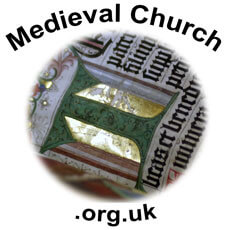Theology on the Web helps over 2.5 million people every year to find high quality theological resources that will help to equip them to serve God and to know Him better (2 Timothy 2:15). Like other websites that provide free services, it is dependent on donations to enable it to grow and develop and only 0.004% of visitors currently do so. If you would like to support this site, please use one of the options to the right of this message.
Synopsis
GOTTSCHALK, ruler of the Wends, and
martyr; was educated in the monastery of St. Michael at Lüneburg, but left
the monks, and abandoned Christianity altogether, as soon as he heard that his
father Uto, ruler of the Wends, had been killed by a Saxon. For the sake of
revenge he stirred up his countrymen to a frightful war against the Saxons;
and, as Christianity was one of the most conspicuous institutions planted among
the Wends by the Saxons, the war began with massacring the Christians, and
destroying their churches. But Gottschalk was finally defeated by Duke Bernard
of Saxony, and taken prisoner, and in his captivity he returned to
Christianity. After a stay of ten years at the court of Canute the Great, King
of Denmark and England, he went back to Wendland,
and by the aid of Canute he united (1047) Holstein, Mecklenburg, Pomerania, and
the Brandenburg marches into one powerful Wendish empire. He became himself one
of the most zealous missionaries Christianity ever had had in those regions. He
translated the liturgical formulas into the Wendish tongue; he built schools,
churches, and monasteries; and he preached himself to his subjects. But there
was among the Wends an actual hatred to Christianity. It broke out once more;
and JujIe 7, 1066, Gottschalk was murdered by his Pagan countrymen.
Wagenmann, "Gottschalk," Philip Schaff,
ed., A Religious Encyclopaedia or Dictionary of Biblical, Historical,
Doctrinal, and Practical Theology, 3rd edn, Vol. 2. Toronto, New York &
London: Funk & Wagnalls Company, 1894. p.894.
Related Subjects
 George H. Tavard, Trina Deitas: the
Controversy Between Hincmar and Gottschalk. Marquette Studies in Theology.
Fordham University Press, 1997. Pbk. ISBN: 0874626366. pp.160.
George H. Tavard, Trina Deitas: the
Controversy Between Hincmar and Gottschalk. Marquette Studies in Theology.
Fordham University Press, 1997. Pbk. ISBN: 0874626366. pp.160. 










